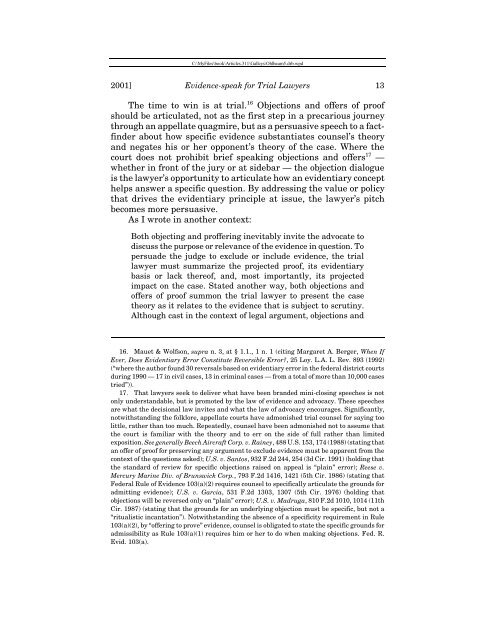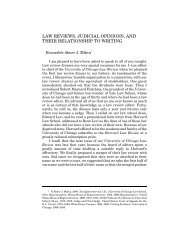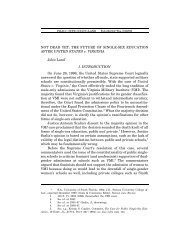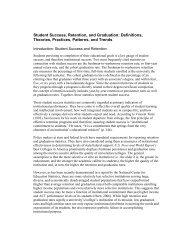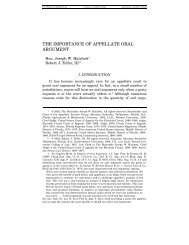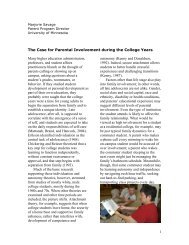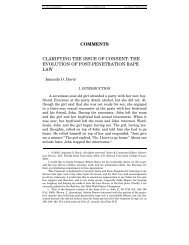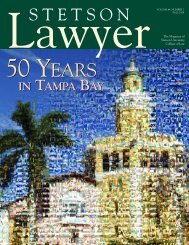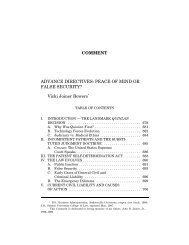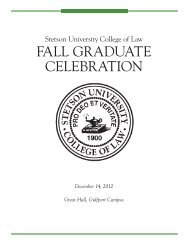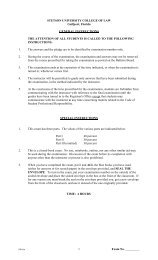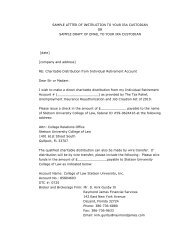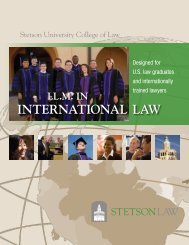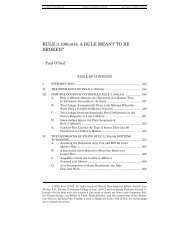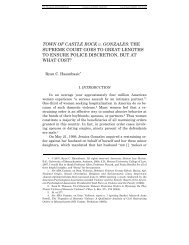Evidence-speak for Trial Lawyers - Stetson University College of Law
Evidence-speak for Trial Lawyers - Stetson University College of Law
Evidence-speak for Trial Lawyers - Stetson University College of Law
Create successful ePaper yourself
Turn your PDF publications into a flip-book with our unique Google optimized e-Paper software.
C:\MyFiles\book\Articles.311\Galleys\Ohlbaum5.drb.wpd2001] <strong>Evidence</strong>-<strong>speak</strong> <strong>for</strong> <strong>Trial</strong> <strong><strong>Law</strong>yers</strong> 13The time to win is at trial. 16 Objections and <strong>of</strong>fers <strong>of</strong> pro<strong>of</strong>should be articulated, not as the first step in a precarious journeythrough an appellate quagmire, but as a persuasive speech to a factfinderabout how specific evidence substantiates counsel’s theoryand negates his or her opponent’s theory <strong>of</strong> the case. Where thecourt does not prohibit brief <strong>speak</strong>ing objections and <strong>of</strong>fers 17 —whether in front <strong>of</strong> the jury or at sidebar — the objection dialogueis the lawyer’s opportunity to articulate how an evidentiary concepthelps answer a specific question. By addressing the value or policythat drives the evidentiary principle at issue, the lawyer’s pitchbecomes more persuasive.As I wrote in another context:Both objecting and pr<strong>of</strong>fering inevitably invite the advocate todiscuss the purpose or relevance <strong>of</strong> the evidence in question. Topersuade the judge to exclude or include evidence, the triallawyer must summarize the projected pro<strong>of</strong>, its evidentiarybasis or lack there<strong>of</strong>, and, most importantly, its projectedimpact on the case. Stated another way, both objections and<strong>of</strong>fers <strong>of</strong> pro<strong>of</strong> summon the trial lawyer to present the casetheory as it relates to the evidence that is subject to scrutiny.Although cast in the context <strong>of</strong> legal argument, objections and16. Mauet & Wolfson, supra n. 3, at § 1.1., 1 n. 1 (citing Margaret A. Berger, When IfEver, Does Evidentiary Error Constitute Reversible Error?, 25 Loy. L.A. L. Rev. 893 (1992)(“where the author found 30 reversals based on evidentiary error in the federal district courtsduring 1990 — 17 in civil cases, 13 in criminal cases — from a total <strong>of</strong> more than 10,000 casestried”)).17. That lawyers seek to deliver what have been branded mini-closing speeches is notonly understandable, but is promoted by the law <strong>of</strong> evidence and advocacy. These speechesare what the decisional law invites and what the law <strong>of</strong> advocacy encourages. Significantly,notwithstanding the folklore, appellate courts have admonished trial counsel <strong>for</strong> saying toolittle, rather than too much. Repeatedly, counsel have been admonished not to assume thatthe court is familiar with the theory and to err on the side <strong>of</strong> full rather than limitedexposition. See generally Beech Aircraft Corp. v. Rainey, 488 U.S. 153, 174 (1988) (stating thatan <strong>of</strong>fer <strong>of</strong> pro<strong>of</strong> <strong>for</strong> preserving any argument to exclude evidence must be apparent from thecontext <strong>of</strong> the questions asked); U.S. v. Santos, 932 F.2d 244, 254 (3d Cir. 1991) (holding thatthe standard <strong>of</strong> review <strong>for</strong> specific objections raised on appeal is “plain” error); Reese v.Mercury Marine Div. <strong>of</strong> Brunswick Corp., 793 F.2d 1416, 1421 (5th Cir. 1986) (stating thatFederal Rule <strong>of</strong> <strong>Evidence</strong> 103(a)(2) requires counsel to specifically articulate the grounds <strong>for</strong>admitting evidence); U.S. v. Garcia, 531 F.2d 1303, 1307 (5th Cir. 1976) (holding thatobjections will be reversed only on “plain” error); U.S. v. Madruga, 810 F.2d 1010, 1014 (11thCir. 1987) (stating that the grounds <strong>for</strong> an underlying objection must be specific, but not a“ritualistic incantation”). Notwithstanding the absence <strong>of</strong> a specificity requirement in Rule103(a)(2), by “<strong>of</strong>fering to prove” evidence, counsel is obligated to state the specific grounds <strong>for</strong>admissibility as Rule 103(a)(1) requires him or her to do when making objections. Fed. R.Evid. 103(a).


